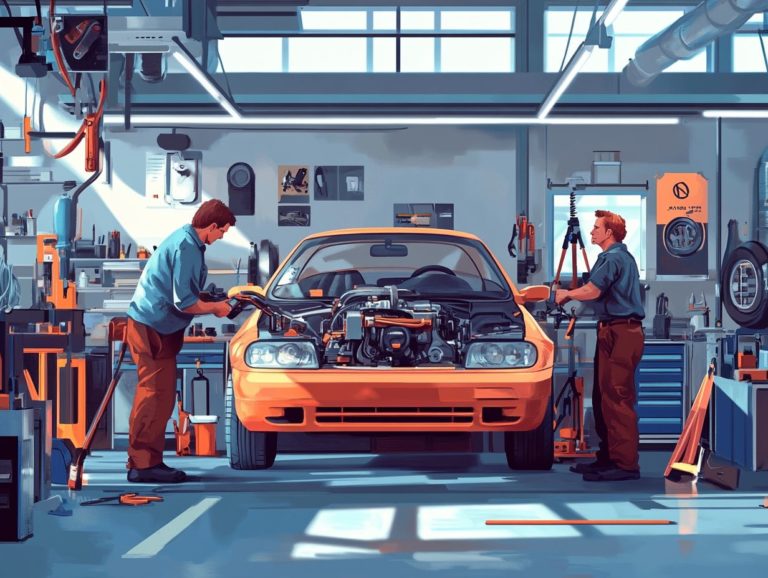Understanding Your Car’s Warranty and Maintenance
Navigating car warranties may seem daunting, but understanding them is critical to protecting your investment. This guide succinctly breaks down everything you need to know, covering the essentials of warranty coverage and the various types available, including manufacturer, extended, and certified pre-owned options.
You’ll delve into key maintenance requirements, common warranty claims, and valuable tips to ensure your warranty remains valid. By the end, you ll be fully equipped to maximize your warranty benefits and steer clear of any costly pitfalls.
Contents
Key Takeaways:

What is a Car Warranty?
A car warranty serves as a contract that offers coverage for various vehicle repairs and replacements, granting you peace of mind in the face of unforeseen mechanical issues and manufacturing defects.
This agreement typically explains the scope of the warranty, specifying limitations, covered components, and conditions for filing claims. Grasping the intricacies of a car warranty is essential for any vehicle owner.
It aids in managing repair expenses and shields you from warranty-related scams. Being well-versed in your warranty’s specifics can significantly shape your decisions. Understanding what to expect from a new car warranty affects your choices about car insurance and maintenance plans, ensuring you make informed decisions tailored to your needs.
Explanation of Basic Warranty Coverage
Basic warranty coverage often provides essential protection against mechanical breakdowns issues that prevent your vehicle from functioning properly and critical repairs. However, it comes with specific limitations of which you should be aware.
This coverage typically includes major components like the engine, transmission, and electrical system, allowing you to tackle unexpected malfunctions without hefty out-of-pocket expenses. However, it s crucial to recognize that certain repairs such as those related to wear and tear or damage from neglect are usually excluded.
Understanding these exclusions is essential; it gives you the power to make informed decisions and prepares you for any potential costs that could arise. Being mindful of the duration and mileage limits of your basic warranty coverage can greatly enhance your consumer protection and overall satisfaction with your purchase.
Types of Car Warranties
You have a range of car warranty options at your disposal, including manufacturer warranties, extended warranties, and certified pre-owned warranties. Each type offers distinct coverage options and benefits tailored to meet your specific needs as a consumer.
Manufacturer, Extended, and Certified Pre-Owned Warranties
Manufacturer, extended, and certified pre-owned warranties represent the three primary categories of car warranties, each addressing various aspects of vehicle maintenance and repair expenses. Each type brings its own set of advantages, tailored to meet your unique needs and expectations.
Manufacturer warranties typically accompany new vehicles, delivering comprehensive coverage for a specified period or mileage, giving you peace of mind regarding repair costs during the early stages of ownership. Extended warranties, conversely, cater to those who want extra protection against potentially costly repairs as their vehicle matures.
They offer additional service options that go beyond the original warranty. Certified pre-owned warranties provide a safety net for buyers of used cars, ensuring you have some reassurance about the vehicle’s reliability and anticipated repair needs, particularly for popular models that might incur higher maintenance costs.
Understanding Maintenance Requirements

Grasping the maintenance requirements of your vehicle is crucial for preserving the validity of your car warranty. By staying informed and understanding your vehicle’s warranty coverage, you can avoid potential claims denials that may arise from overlooked maintenance obligations.
Recommended Maintenance Schedule
A well-recommended maintenance schedule for your vehicle typically includes routine services like oil changes and tire rotations. These tasks are pivotal in extending its lifespan.
In addition to these essential tasks, consider regular inspections of your brake systems, fluid levels, and battery health. This diligence ensures that everything operates smoothly and efficiently.
Make sure you schedule your air filter replacements and spark plug checks at the right intervals! These actions can significantly enhance your engine’s performance and fuel efficiency.
As a vehicle owner, think about seasonal services as well like coolant flushes before the summer heat and winterization checks to prepare for the chillier months.
By adhering to this meticulous maintenance schedule, you can dramatically reduce the risk of unexpected repairs and their costs. Ultimately, this protects the investment you’ve made in your vehicle.
Common Warranty Claims and Coverage
Common warranty claims typically encompass repairs associated with mechanical failures, electrical components, and various other parts included under the warranty. However, it’s crucial for you to be mindful of the limitations that may apply to your warranty coverage.
Examples of Covered Repairs
Examples of covered repairs under your car warranty can include a range of mechanical defects like engine failures, transmission issues, and malfunctioning electrical components. Your warranty may also cover repairs for air conditioning failures, brake system breakdowns, and fuel system problems.
Many plans even extend their coverage to issues with the vehicle’s computer system and sensors that help it operate properly. By addressing these mechanical defects, warranties can alleviate the burden of unexpected repair bills. This provides you with peace of mind as a car owner.
Understanding the specifics of what s covered can significantly impact your decision when purchasing a warranty. This knowledge can potentially save you substantial costs over time.
Tips for Maintaining Warranty Coverage
Maintaining your car warranty coverage demands a keen eye and a commitment to best practices. It’s essential to keep meticulous records of all necessary maintenance and ensure you comply with the scope of car warranty coverage requirements.
This diligence not only safeguards your investment but also enhances the longevity of your vehicle.
Best Practices for Keeping Your Warranty Valid

To maintain the validity of your warranty, it s crucial to adhere to maintenance requirements and manage your warranty paperwork with care. This ensures your consumer protection remains intact.
Staying proactive with scheduled services not only extends the life of your purchase but also reinforces the legitimacy of your warranty. Regular check-ups, conducted by certified professionals, should be recorded meticulously. These documents can be essential when any claims come into play.
It s equally important for you to familiarize yourself with the specific terms and conditions outlined in your warranty documents. This knowledge gives you the power to make informed decisions and steer clear of any accidental violations.
Using warranty management systems can help you stay organized, ensuring that all necessary documents are at your fingertips when challenges arise.
Making the Most of Your Warranty
To truly leverage your car warranty, it’s essential for you to grasp the nuances of maximizing its benefits. Understanding what you need to know about car maintenance insurance will give you the power to sidestep common pitfalls that could result in denied claims or inflated repair costs.
Maximizing Benefits and Avoiding Pitfalls
To maximize the benefits of your car warranty, you need to understand the claims process. Also, being aware of potential pitfalls is essential.
Navigating the claims process can feel daunting due to the various stipulations from different providers. It s crucial for you, as a vehicle owner, to familiarize yourself with your warranty’s specific terms and conditions.
Ignoring established procedures can lead to denied claims, which is the last thing you want. By meticulously reviewing the fine print and keeping all essential documentation such as service records and repair receipts you can protect yourself from unexpected complications.
Reach out now for clarity! Contact customer service representatives for any confusing elements. Taking this extra step can greatly improve your experience.
Frequently Asked Questions
What is a car warranty?
A car warranty is a contract between the car manufacturer and the buyer that covers certain repairs or replacements for a specific period or mileage.
What does a car warranty typically cover?

Car warranties vary, but they usually cover defects in materials or workmanship, as well as specific parts and systems of the car. This includes the engine, transmission, and electrical systems.
Do all cars come with a warranty?
No, not all cars come with a warranty. Some used cars may lack a warranty, while some new cars may offer the option to purchase one separately.
What s Included in Maintenance?
Car maintenance involves regular services like oil changes, tire rotations, and fluid top-offs. It also includes more extensive repairs or replacements as needed.
What happens if my car needs repairs during the warranty period?
If your car needs repairs during the warranty period, take it to an authorized dealership or repair facility. However, some warranties may have limitations, so it s important to read the fine print.
What should I do if my warranty is about to expire?
If your car’s warranty is about to expire, consider purchasing an extended warranty or maintenance plan to maintain coverage. Also, start saving money for potential repairs or researching reliable car repair shops for future needs.
Have more questions? Let us know in the comments!






